Catholics and the 2008 Elections
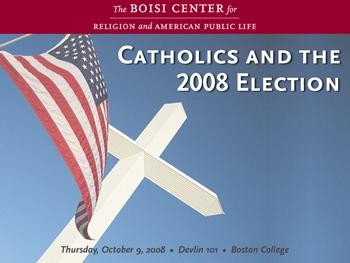
Amy Sullivan, TIME Magazine
Michael Sean Winters, America and Catholic World Magazines
Alan Wolfe, Boston College (moderator)
Date: October 9, 2008
Abstract
Faith and politics do mix, and America’s 70 million Catholics are among the most important swing voters in the 2008 presidential election. The Church’s official views, like those of American Catholics, are impossible to characterize as simply liberal or conservative, and each party is striving to maximize its appeal to Catholic voters in this tight election. Can the Democrats overcome the so-called “God gap” by appealing to Catholics on issues of faith, social justice and war? Can the Republicans continue their successful appeal to conservative Catholics on issues of sexuality, marriage and abortion? Join us for a lively panel discussion with experts on Catholics and American politics.
Speaker Bios
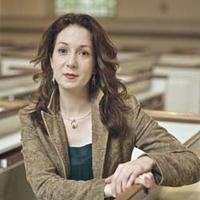
Amy Sullivan is a national correspondent for TIME magazine, and author of the book The Party Faithful: How and Why Democrats are Closing the God Gap (Scribner, 2008). Sullivan's work has appeared in publications including the Boston Globe, Los Angeles Times, The New Republic, and The Washington Post, and was included in The Best Political Writing 2006. She is a frequent guest on radio and television talk shows. Previously, Sullivan served as an editor of The Washington Monthly and worked for both the Pew Forum on Religion and Public Life and U.S. Senator Tom Daschle. She holds degrees from the University of Michigan and Harvard Divinity School.
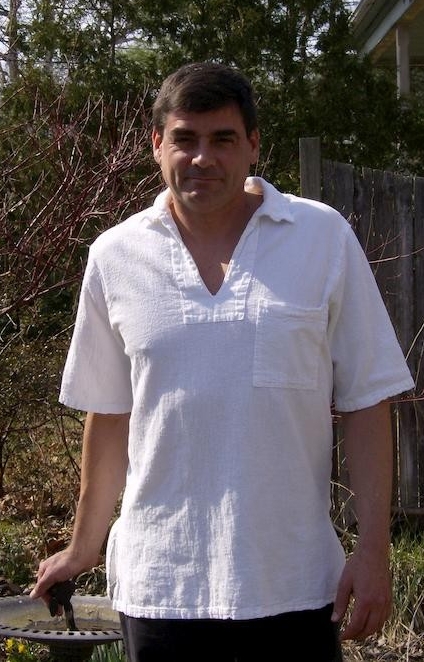
In 2002, National Journal’s Hotline asked George Stephanopoulos, “Who is the most important person in Washington nobody has ever heard of?” He replied, “Michael Sean Winters.” Michael Sean Winters is the author of the newly published book Left at the Altar: How the Democrats Lost the Catholics and How the Catholics Can Save the Democrats (Basic Books, 2008). He writes the daily political blog for the Jesuit magazine America and is the political columnist for The Catholic World. His articles have appeared in The New Republic, The New York Times Magazine, Slate and other publications. An alumnus of the Catholic University of America, Winters resides in Riverdale, Maryland and is a parishioner at the Cathedral of St. Matthew in Washington, D.C.
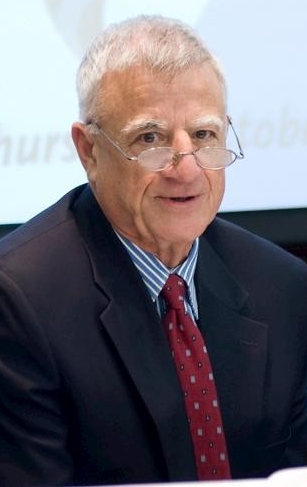
Alan Wolfe is the founding director of the Boisi Center and Professor of Political Science at Boston College. He is author of more than a dozen books, including The Future of Liberalism (Knopf, 2009), Does American Democracy Still Work? (Yale, 2006), One Nation After All (Penguin, 1999) and The Transformation of American Religion: How We actually Practice our Faith (Free Press, 2003). Widely considered one of the nation's most prominent public intellectuals, he is a frequent contributor to the New York Times, Washington Post, and Atlantic Monthly, and has delivered lectures across the United States, Europe and Middle East. (More info on Alan Wolfe...)
Event Photos
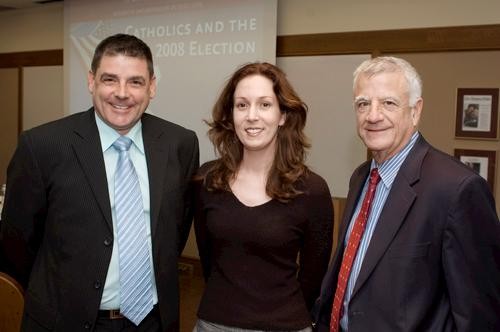
From left to right: Michael Sean Winters, Amy Sullivan, Alan Wolfe
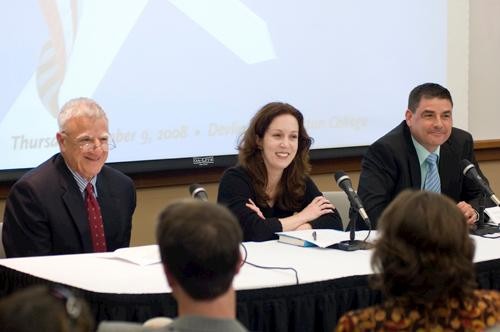
From left to right: Alan Wolfe, Amy Sullivan, Michael Sean Winters
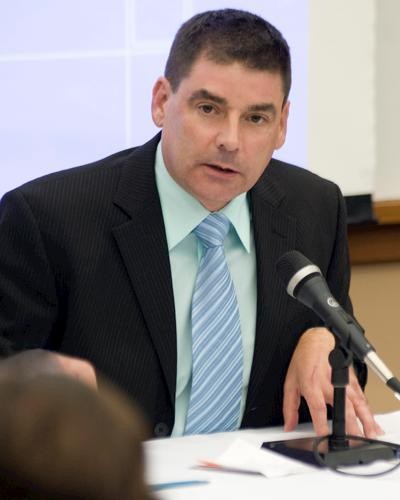
Michael Sean Winters

Alan Wolfe
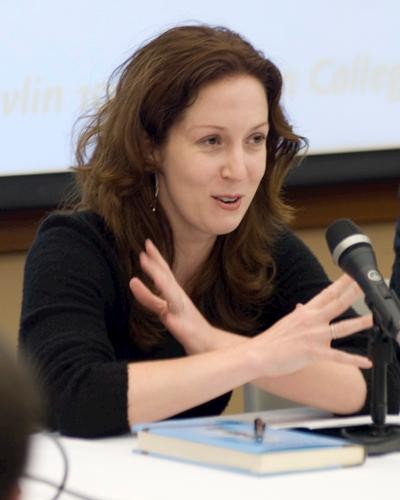
Amy Sullivan
Event Recap
As the presidential campaign season raced towards election day, the Boisi Center hosted a panel on October 9 about the important role Catholic voters and the Catholic Church were sure to play. Two experts on Catholics and American politics, Amy Sullivan and Michael Sean Winters, joined our own Alan Wolfe for a lively discussion. Sullivan is a national correspondent for TIME and author of The Party Faithful: How and Why Democrats are Closing the God Gap; Winters is a contributor to prominent Catholic magazines America and The Catholic World, and author of Left at the Altar: How the Democrats Lost the Catholics and How the Catholics Can Save the Democrats.
Sullivan began by charting the evolution of the relationship between Catholics and Democrats since the early part of the twentieth century. During the New Deal era, Catholics and liberals had a strong bond as they sought to promote economic equality in the United States. Abortion was the singular issue that came to divide the two groups, in part because liberals underestimated the passion with which Catholics opposed abortion. Winters placed blame for this separation between liberals and Catholics on President John F. Kennedy, whose public declarations of a separation between his religious beliefs and his politics caused Democratic politicians to develop an “aversion to enunciating a moral vision of the country.”
Sullivan and Winters commented upon several significant transformations in the electorate and political landscape in 2008. Among their observations were that lay Catholic groups are now in a position to push back against conservative leadership, that Catholic Democratic politicians are reimagining the way they talk about faith and that divisive social issues were likely to take a back seat to the economy as the central motivating force in the election.
Read More
Further Reading
Amy Sullivan
The Party Faithful: How and Why Democrats are Closing the God Gap. Scribner, 2008.
Read Chapter 1 from The Party Faithful
“How Would Jesus Vote?” Op-Ed in the Washington Post 2.24.08
“The Dems’ Delicate Dance on Faith.” Time 4.15.08
“Jeremiah Wright Goes to War.” Time 4.28.08
“Why Obama Seized the Faith-based Mantle.” USAToday.com 7.28.08
Michael Sean Winters
Left at the Altar: How the Democrats Lost the Catholics and How the Catholics Can Save the Democrats. Basic Books, 2008.
“Anti-Gay Auto-Da-Fé.” slate.com 9.28.05
“Wholly Different Angles on the World.” The Washington Post, 3.30.08
Related Readings: Religion and Elections
One Electorate Under God?: A Dialogue on Religion and American Politics (Pew Forum Dialogues on Religion & Public Life) by E.J. Dionne.
Religion Returns to the Public Square: Faith and Policy in America (Woodrow Wilson Center Press). Edited by Hugh Heclo and Wilfred M. McClay.
"A Fight Among Catholics Over Which Party Best Reflects Church Teachings" David D. Kirkpatrick. New York Times, 10.4.09
“Young Evangelical Christians in the 2008 Election,” a survey conducted by Greenland Quinlan Rosner Research.
A summary of the findings:
“A recent survey conducted for Religion & Ethics NewsWeekly by Greenberg Quinlan Rosner finds that young white evangelical Christians are less supportive of John McCain for president than their older counterparts. Although McCain maintains a solid winning margin among white evangelical Christians on the ballot, white evangelicals ages 18-29 are less supportive of his candidacy and express less favorable impressions of McCain than older white evangelical Christians.”
The Pew Forum on Religion and Public Life: “Religion and Election 08.” This website provides biographies focused on religion of the candidates and their running mates; public opinion polls and analysis; and current events regarding the role of religion in this year’s presidential election. Also useful and interesting is the U.S. Religious Landscape Survey. Based on interviews with more than 35,000 American adults, the Pew survey examines Americans’ approaches to and understandings of religion, and the connection between those perceptions and their social and political positions. On the survey’s homepage are related materials, interactive tools and other supplementary information to the survey.

